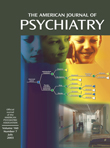Impact of Antidepressant Discontinuation After Acute Bipolar Depression Remission on Rates of Depressive Relapse at 1-Year Follow-Up
Abstract
OBJECTIVE: While guidelines for treating patients with bipolar depression recommend discontinuing antidepressants within 6 months after remission, few studies have assessed the implications of this strategy on the risk for depressive relapse. This study examined the effect of antidepressant discontinuation or continuation on depressive relapse risk among bipolar subjects successfully treated for an acute depressive episode. METHOD: Eighty-four subjects with bipolar disorder who achieved remission from a depressive episode with the addition of an antidepressant to an ongoing mood stabilizer regimen were followed prospectively for 1 year. The risk of depressive relapse among 43 subjects who stopped antidepressant treatment within 6 months after remission (“discontinuation group”) was compared with the risk among 41 subjects who continued taking antidepressants beyond 6 months (“continuation group”). RESULTS: A Cox proportional hazards regression analysis indicated that shorter antidepressant exposure time following successful treatment was associated with a significantly shorter time to depressive relapse. Furthermore, patients who discontinued antidepressant treatment within the first 6 months after remission experienced a significantly shorter period of euthymia before depressive relapse over the length of 1-year follow-up. One year after successful antidepressant response, 70% of the antidepressant discontinuation group experienced a depressive relapse compared with 36% of the continuation group. By the 1-year follow-up evaluation, 15 (18%) of the 84 subjects had experienced a manic relapse; only six of these subjects were taking an antidepressant at the time of manic relapse. CONCLUSIONS: The risk of depressive relapse in patients with bipolar illness was significantly associated with discontinuing antidepressants soon after remission. The risk of manic relapse was not significantly associated with continuing use of antidepressant medication and, overall, was substantially less than the risk of depressive relapse. Maintenance of antidepressant treatment in combination with a mood stabilizer may be warranted in some patients with bipolar disorder.



